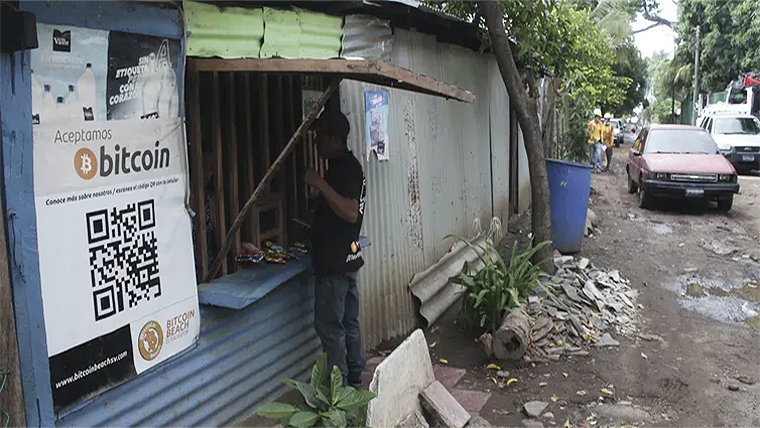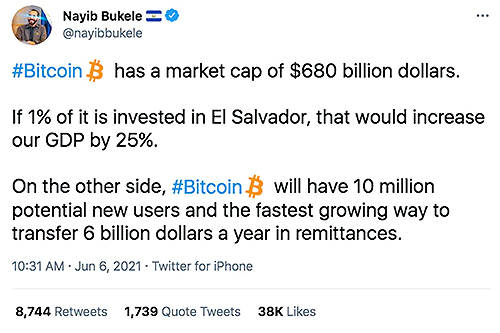
By John Hawkins*
Nayib Bukele, president of El Salvador, has got himself a pair of laser eyes – on his Twitter profile at least.
Laser eyes are something social media users give themselves to show they love cryptocurrency – and Bukele proved his crypto-enthusiasm last week by having El Salvador become the world’s first nation to make Bitcoin legal tender.
El Salvador’s parliament passed Bukele’s proposed legislation on June 9, after he announced his plan just a few days earlier. The law will take effect in September.
Some Bitcoin fans have leapt on this as a step towards much broader acceptance. But the changes in Bitcoin’s market value since Bukele announced his plan gives crypto-sceptics reason for doubt.

Nayib Bukele’s Twitter profile image. Twitter
Over the past week Bitcoin’s value was as high as US$38,200 (about A$49,000) and as low as US$31,428. Over the past month it has fallen from more than US$58,000. This isn’t the type of price volatility any government generally wants to see in a currency.
Such fluctations show Bitcoin’s weakness as a viable alternative to central bank currencies – good only for transactions you don’t want traced and as a speculative investment.
So what is Bukele thinking in wanting to make Bitcoin legal tender for the small central American nation (population about 6.5 million) whose economy accounts for less than 0.05% of global GDP?
What does ‘legal tender’ mean?
Before we get to that, let’s clarify what making Bitcoin legal tender means.
Using Bitcoin is already legal in El Salvador, as it is in most countries. If you want to pay for something in bitcoins, and the recipient is willing to accept them, it’s all good.
Making bitcoins legal tender mean a payee will have to accept them. As the new legislation states, “every economic agent must accept Bitcoin as payment when offered to him by whoever acquires a good or service”.
El Salvador making this move isn’t as significant as it would be for most nations, because it is one of about a dozen countries – most of them micro-states such as Andorra and Nauru – without its own currency (or a common currency such as the Euro).
El Salvador abandoned its own currency (the “colon”, named after Christopher Columbus) in 2001 and adopted the US dollar as its legal tender. This process of “official dollarisation” was seen as a reform that would curb inflation and increase trade with the US (by far its major trading partner).
So El Salvador has less to lose than other nations in adopting a second currency as legal tender. There is no controversy about losing sovereignty and monetary policy autonomy. There will be no loss of “seignorage” – the profit made on issuing currency that’s worth a lot more than the cost of making it.
Highly volatile
But having two legal tenders will complicate matters – particularly when one of those currencies is subject to wild swings in its value.
Consider the provision in the new law that “all obligations in money expressed in USD, existing before the effective date of this law, may be paid in bitcoin”.
Even that is complicated. How, and by whom, will the amount of bitcoins necessary to pay a debt be determined? Will it be based on the Bitcoin price at the time the debt was incurred, or when the debt falls due?
The difference of even a few days could be significant.
If the expectation is the price of Bitcoin is going to rise, why would you want to buy things with it? Why not wait? If the expectation is the price is going to fall, why would you want to accept it? For most transactions, using US dollars will still make the most sense.
So making Bitcoin legal tender could help destabilise El Salvador’s economy.
Increasing El Salvador’s GDP
Things would have been simpler if El Salvador had adopted a “stablecoin” whose price is fixed at one US dollar – such as Tether, the third-largest cryptocurrency.
But that would have not been nearly so newsworthy, and would have defeated the apparent reason Bukele has championed this move.
Bukele’s reasoning, delivered via Twitter on June 6, is that Bitcoin has “a market cap of US$680 billion” and:
If 1% of it is invested in El Salvador, that would increase our GDP by 25%.
This argument – which appears to be the only “analysis” Bukele has made public – seems very confused.

Bukele explains his Bitcoin plan on Twitter. Twitter
Market capitalisation typically refers to a listed company’s valuation, based on multiplying the share price by the number of shares. The $US680 billion Bitcoin market cap Bukele referred to represents the currency’s market value multiplied by the number of bitcoins created so far. (For comparison, the market cap of Tether’s 63 billion coins in circulation is US$63 billion.)
But it is flawed logic to think Bitcoin’s total market value equals money bitcoin owners around the globe are looking to invest anywhere.
In very few cases do people buy bitcoins to invest in other things. Bitcoins are their investment. Neither major funds nor average punters holding bitcoins are likely to want to start investing in El Salvador.
Nor is foreign investment a component of GDP (which is the value of market transactions in an economy). Foreigners using bitcoins to buy assets such as land in El Salvador would bid up its price but not necessarily increase GDP. A surge in foreign investment into new infrastructure and businesess that increase productive capacity would contribute to GDP, but there’s no reason to think giving Bitcoin legal tender status will make this more likely.
Facilitating remittances
A second reason given by Bukele is that Bitcoin “will have 10 million potential new users” and is “the fastest growing way to transfer 6 billion dollars a year in remittances”.
This apparently refers to both the population of El Salvador (about 6.5 million) and Salvadorans living abroad, many of whom send money home to help their families. In 2020 these remittances totalled US$5.9 billion, or 23% of El Salvador’s GDP.
While any cryptocurrency can well facilitate more efficient transfers (without the charges banks impose), the significance of remittances to the Salvadoran economy points to another issue. El Salvador is a poor country, with one of the lowest rates of internet use in the Americas – 33% in 2017, according to World Bank data.
How many vendors, street hawkers or farmers are equipped to handle cryptocurrency transactions? US dollars will more than likely remain the default currency.
The benefits of making Bitcoin legal tender are far from clear. El Salvador is already facing higher interest rates as international investors are worried about the move. There are concerns wider use of Bitcoin will facilitate the black economy and make tax avoidance easier.
So this is a great experiment.
For the sake of El Salvador’s people, let’s hope it is successful. But the odds are on it being further evidence of the cryptocurrency’s unsuitability for use as a real currency – confirmation that Bitcoin is nothing more than a speculative gamble.![]()
John Hawkins is a senior lecturer at the Canberra School of Politics, Economics and Society and NATSEM, University of Canberra. This article is republished from The Conversation under a Creative Commons license. Read the original article.
46 Comments
If they were really smart they would adopt a gold standard - real money.
Not sure how that would help El Salvador. But feel free to explain.
rastus,
love to hear you explain just how they would do that.
To start with, they'd actually have to be capable of creating their own currency.
How about actual Gold used in the center of a a coin ?
Bitcoin is gold but with all the drawbacks of gold fixed.
Gold helps store value over time but is difficult to move over space. Try sending 1kg of gold anywhere quickly and cheaply - not happening.
Fiat is good at moving value over space but inflation means it is terrible over time.
Bitcoin enables value to be stored across space and time. It's beautiful when you understand.
You are assuming inflation is a bad thing. Bitcoin is massively deflationary: as the economy or user base grows, the value of a coin increases. Let's say the whole world moved to Bitcoin over a 20 year period, the value of a bitcoin would grow massively over that period as the number of users grew. That would be 20 years of extreme deflation where you would be stupid to buy anything with your money. Because of this it can never be a proper currency IMO.
I'd recommend Jeff Booth's book, The Price of Tomorrow - Why a Deflation is the Way to an Abundant Future.
Deflation is only a bad thing if your economy is run on ever increasing amounts of cheap debt fuelling asset prices. Deflation would stimulate savings, aggregates of capital and wise investments in productivity. It would also stretch your paycheck further. Sounds horrific.
"Deflation would stimulate savings, aggregates of capital and wise investments in productivity."
A complete load of horse poop obviously
Theres a reason central bankers are fighting deflation AT ANY COST
Deflation kills the economic system
Then the trucks stop
Also by your theory the JimboJones coin is gold but with all the drawbacks of gold fixed. Care to buy some?
Facepalm...
Gold has been a store of value for something like 6000 years. Bitcoin has increased in value spectacularly over 20. The big drawback of Bitcoin over Gold is in the uncertainty of it's longer term value.
"The big drawback of Bitcoin ... is in the uncertainty of it's longer term value."
Its certain
Zero
Hope you are putting your money where your mouth is! I certainly am
El Salvador is a poor country, with one of the lowest rates of internet use in the Americas – 33% in 2017, according to World Bank data.
Nice one boomer but it's much better to use mobile phone penetration (146% in El Salvador according to some sources) to understand people's access to cryptocurrency or money. I do agree that Salvadorans are unlikely to sit around home in the evenings in their slippers tapping away on a desktop computer. If it were not for the mobile phone, the banking revolution would never have started in Africa.
https://www.vox.com/future-perfect/21420357/kenya-mobile-banking-unbank…
https://dai-global-digital.com/digital-insights-el-salvador-mobile-adop….
Not sure I've seen many articles debunked with a single stat JC - kudos. When 70% of El Salvadorians are un-banked, but there's 146% mobile penetration John Hawkins looks like an old, out of touch fool quoting his "World Bank" internet stat from 2017.
What isn't a speculative gamble at this point?
No laser eyes do not mean they love “Cryptocurrency” It means they support Bitcoin, not all the other shitcoins.
This legislation will have rather large international ramifications, as Bitcoin can not longer just be ignored and swept under the table as easily as it has been in the past. The IMF is already trying to blackmail ES with a $1billion loan it is planning to give them.
Lol his line about the changes in Bitcoins market value over the last few weeks…No it doesn’t give us any reason for doubt. Short term price is irrelevant for the multi-year outlook.
Over the last month, nice cheery picking mate, how about going back a further couple of months and you will see we are still up from October by 300% with a peak of ~%550.
Or you can go all the way back to the crazy peak in 2017 of 20k, and we are still up 100% form there.
Lol transactions you don’t want traced, idiot, and speculative investment, no that entirely depends on how you use it.
Yes everyone has to accept Bitcoin, unless they are not technologically equipped to do so, such as an elderly fruit merchant for example.
Exactly, they have nothing to loose, but a significant amount to gain.
Yes it is volatile, that is why if you do not want to hold the Bitcoin, the El Slevadorian central bank will have a $150m fund available for anyone to use to convert their BTC back to USD if they don’t want to hold it.
WTF, why would you want to adopt a stable coin, when the USD is already their national currency?? and the fees to use tether are actually a lot higher than lightning.
Well the second part of the tweet is probably the most significant part of the story…
Yes there is already talks in the Bitcoin circles about several individuals and companies at least setting up operations or going to visit ES, and all that brings in money which will contribute to GDP.
Remittances:
70% of the population does not have a bank account, if relatives abroad want to send money home, they have to wire it to a western union, incurring rather significant fees. Then the people in ES have to physically travel, often many hours, to the western union to physically pick up the check. And then, they have to contend with the gangs that often hang around outside, because they know everyone is there to pick up money.
On the other hand, there are ~140% more phones than people, and I don’t think their internet stats include mobile data access.
Strike is onboarding 15,000-20,000 new users per day in ES. This uses the lightning network to go from usd => BTC => over the lightning network to the recipient => and then straight back into usd (if they want to) with less than a rounding error of fees.
https://twitter.com/CaitlinLong_/status/1401334421773504517?s=19
Caitlin Long has a good initial explainer thread about some of the potential ramifications.
https://twitter.com/PeterMcCormack/status/1404472405549060100?s=20
Using the Lightning network to buy coffee
https://twitter.com/business/status/1403001064752705536
IMF against freedom
https://twitter.com/nayibbukele/status/1402680890057166858
The president is already looking at mining Bitcoin with geothermal energy
https://twitter.com/jackmallers/status/1402791643372298240
The man behind strike himself, Jack Mallers. Amazing young man.
Basic overviews:
https://www.coindesk.com/its-official-el-salvadors-legislature-votes-to…
https://www.businesswire.com/news/home/20210605005045/en/Strike-Drives-…
Passionate stuff there Gally. Quite a bit of the ol' ultra-orthodox shining through but hey but that's what we've come to expect. You may a good foot soldier for the cause.
Yes .... the problem with the economic system is the remittance fee charges ??????
Bitcoin will remove this HUGGGGGGGGGGGE problem
"...which will contribute to GDP."
GDP is DEBT!!!!!
Fiat
you dont appear to know what money is
You don't seem to know either Ham?
Without realising it you've touched on the core issue here Ham. CBs vs Bitcoin is Keynesian vs Austrian economic theory in practice.
... if a government embarks on the building of a pyramid, which adds absolutely nothing to the well-being of individuals, the GDP framework will regard this as economic growth. In reality, however, the building of the pyramid will divert real funding from wealth-generating activities, thereby stifling the production of wealth. - https://mises.org/library/what-gdp
Remittance fees paid to forex companies with their head-quarters in Panama and the Cayman's add nothing to the well-being of the individuals in El Salvador. Capital diverted away in this manner is real funding removed from the wallet of the commoner on the street stifling locally owned business wealth-generating activities.
The problem with the old guard is, when it comes to crypto and the economic theory driving it, they can't see the wood for the trees. That linked Mises article might as well be in French for all you and most central banks care.
Here you go, fill your boots https://www.dailyinfographic.com/keynesian-economics-vs-austrian-econom…
Wealth is a claim on resource (output) ... without the resource output, all GDP and economic theories are piss in the wind
Bitcoin is a "solution" looking for a problem
Im not sure how many times it needs to be said
We dont have a MONEY problem ...
We have a surplus resources problem ... WHICH was the whole reason we abandoned the Gold reserve in the first place
When Bitcoin can magically increase resources per capita, then its a "solution"
Otherwise its ONLY value appears to be measured in its numbers go up in FIAT wealth
Its a casino
The short answer is "No". Desperate countries are trying this as a last ditch effort to save themselves. They have run out of options. The rest of the West still has all the Aces.
Even more interesting is the reaction of El Salvador’s neighbors. These countries understood that El Salvador would create jobs and attract many entrepreneurs from the Bitcoin world. Eventually, it will boost its GDP in the years to come. De facto, all of them are positioning themselves to say that they want to go down this path.
This includes Panama, Venezuela, Nicaragua, Paraguay, Argentina, but also Brazil and Mexico.
El Salvador was the first domino that will take with it all the rest of Central and South America. All of these countries are suffering from the US dollar system, and their populations already recognize Bitcoin as a plan A. Doing the same at the State level will be seen as an extremely popular decision.
What happens in El Salvador in the coming months will be extremely scrutinized. The success that Bitcoin will have there and what it will do for the thousands of Salvadorans who live in very precarious conditions will change the perception that many Westerners have of Bitcoin.
"They have run out of options" - yes apart from printing FIAT - the west has run out of options.
El Salvador hasn't had their own currency, hence the option of printing fiat currency, for decades.
The rest of the West still has all the Aces.
Care to elaborate? USD, AUD, NZD, GBP, CAD are losing their value in terms of a store of value compared to BTC.
deleted
How they handle volatility in BTC will be interesting. Will they price in BTC? if so how do you determine it?
Do they convert USD price to Bitcoin? if so at what point. One would have to think at the exact time of the transaction.
I think that's the only option really.
You would think so, but then is it really a currency?
My understanding, speaking to someone who lives in El Salvador, is that the bitcoin can be converted instantly to fiat upon reception, if the recipient so chooses.
And the government is going to set up a fund to guarantee any price slippage. So if you sell something for $10 and you get paid in bitcoin, it'll automatically be converted to $10 for you and the government will buy the bitcoin off you.
The problem is it requires the government to set a price for bitcoin, and if the actual price of bitcoin is less than the government's peg, the government has to top up all transactions. Very quick way for the state to run out of money.
Ooof. That sounds like a horrifically bad idea. A big fall in Bitcoin and the El Salvadoran state is bankrupt overnight. I guess it helps hedge BC / US$ ratios for everyone else. Would the pledge work in the other direction, so the gov't takes a profit if BC goes up vs the dollar?
They are bankrupt ready along with a load of other counties like Venezuela. They are desperate and will try anything so Bitcoin is a last resort. Truly sad the state some countries in the world today.
Except they plan to mine bitcoin at a state level with 100% volcanic energy, so their bags will be full. Sounds petty genius to me, esp if the price does pump.
Betteridge's law of headlines: "Any headline that ends in a question mark can be answered by the word no."
Lol.
Although on reflection reading up on what NATSEM is, this article makes much more sense. Read the summary of what they do on their home page. In light of MMT and QE it's quite hilarious. Imagine being a future graduate studying under this guy and graduating with your worthless PhD in economics 8 years from now when BTC has "collapsed" another thousand times and is sitting at a couple of million USD and literally freed the third world from the likes of the IMF, WTO and other corrupt governance structures. SMH.
Paul Tudor Jones Increases Bitcoin Position to 5% - The FED & Why Inflation Isn't Transitory
https://www.youtube.com/watch?v=xAftFlWrM9I
Well if everyone allocated 5% to BTC, I would be tempted to go 80%.
An interesting thought - academics like this bozo have no skin in the game, and nothing of real consequence to lose by spouting off about these things they seem to know next to nothing about. Compare that to Michael Saylor who's company Microstrategy has been battle tested through the dotcom boom of the 90s and is in the process of raising $1.5B USD to drop into the Bitcoin network which will push the BTC price over $100k. I'm sick of people with no real world experience having influence on things from their ivory towers. That includes the current Labour government. I think most people in the third world are sick of it too. But their motivation is much more pressing.

We welcome your comments below. If you are not already registered, please register to comment
Remember we welcome robust, respectful and insightful debate. We don't welcome abusive or defamatory comments and will de-register those repeatedly making such comments. Our current comment policy is here.